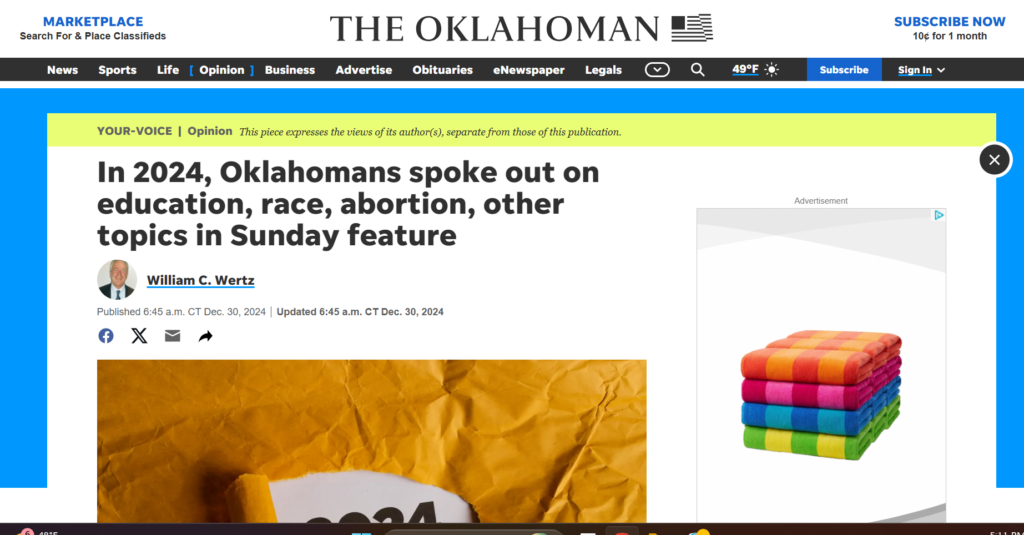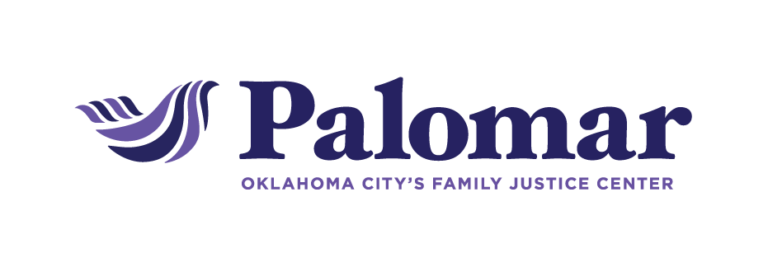THE OKLAHOMAN: In 2024, Oklahomans spoke out on education, race, abortion, other topics in Sunday feature
By: William C. Wertz
Date: December 30, 2024

In 2024, The Oklahoman launched a Sunday feature called “Get to Know.” Every week we introduce or re-acquaint our readers with members of the community who are doing great things and have ideas worth sharing.
This series continues in 2025 with a story in this issue about a Vietnamese couple who are dedicated to reinforcing Asian culture in Oklahoma City and developing business opportunities throughout the community for a new energetic and entrepreneurial generation.
As the new year begins, we’d like to celebrate the ideas and accomplishments of some of the Oklahomans we got to know a bit better in 2024 and graciously shared their experiences, opinions and ideas for the future. Their thoughts on education, mental health and more are well worth a second look.
Here is a brief review of some of their comments:
Domestic Violence
“Historically it (domestic violence) hasn’t been a priority of the state. It doesn’t even have a single line item in its budget for victim services, not through DHS or any other entity. The bulk of the agencies we work with are non-profits that get their funding federally, and that has decreased 25% over the past five years. We really need state support. It’s a public safety issue, a public health issue. We’ve been asking and advocating and trying to garner state support, but we’re not there yet.” ― Kim Garrett-Funk, director and founder of Palomar, a nonprofit organization created to help victims of domestic violence and sexual abuse.
Free Legal Aid
“Legal Aid doesn’t have the capacity to do all that needs to be done. We do the best we can. We try to be where our clients already congregate. Health care facilities, for example. We’re at 35 different hospitals and clinics across the state. We have about 230-240 lawyers, and that makes us the biggest law firm in the state, which isn’t known by a lot of people. Why don’t more people come? Transportation is still an issue. People are sometimes intimidated, thinking they have to go to a legal office. They may think they’re going to get charged, even though we don’t charge anybody anything.” ― Michael Figgins, executive director of Legal Aid Services of Oklahoma.
Civil Rights in Oklahoma City
“I walked picket lines and took part in a couple of big marches, including one that we called Black Friday when the students from Douglass High School came downtown and joined. I remember when the National Guard surrounded us in a circle when we were at the front of the line with Mrs. Luper. They had their guns out, and I remember all of us looking at each other, with Mrs. Luper telling us to just remain calm. That was the most frightening thing I ever encountered.” ― Joyce Jackson, a life-long civil rights activist who became the first Black American female journalist on Oklahoma City television.
Modifying Oklahoma’s abortion law
“We face the specter of a state question that would have Oklahomans amend their state constitution to allow for abortion up to the time of birth. That’s not what I think Oklahomans believe. When I’m in consultation with different groups, I’ve learned that I am a pro-life woman who can accept that we should defer in cases of saving the life of the mother, or in the case of rape or incest as long as it’s reported to law enforcement. Those exceptions aren’t in our laws now, because they were in bills the Supreme Court threw out. I would need to bring my colleagues along with me, but if we’re to succeed in stopping abortion on demand up until the time of birth, we need to make this — you can call it a concession if you want — if you want the support of the public whose votes we need in order to protect life to the greatest extent possible. ― Julie Daniels, majority leader of the Oklahoma Senate.
Opportunity for Latinos
“Latinos are entrepreneurial. They have that mindset. We have a tremendous amount of restaurants that are popping up. Construction is always going to be a big employer for our community members. But what I’m seeing is there is a big interest among young people in furthering their education, getting degrees and even advanced degrees, and that could be in the accounting world, the legal and medical world. There’s a young population that is becoming more and more excited about education. But that may not be for everyone, and it’s promising that you can go to Metro Tech right now and get yourself a welding certificate and be in a position to make six figures in the next five years, working as a welder.” ―Salvador Ontiveros, president and CEO of Oklahoma City’s Latino Community Development Agency.
Opportunity for Latinos
“Latinos are entrepreneurial. They have that mindset. We have a tremendous amount of restaurants that are popping up. Construction is always going to be a big employer for our community members. But what I’m seeing is there is a big interest among young people in furthering their education, getting degrees and even advanced degrees, and that could be in the accounting world, the legal and medical world. There’s a young population that is becoming more and more excited about education. But that may not be for everyone, and it’s promising that you can go to Metro Tech right now and get yourself a welding certificate and be in a position to make six figures in the next five years, working as a welder.” ―Salvador Ontiveros, president and CEO of Oklahoma City’s Latino Community Development Agency.
Children in poverty
“One out of five children live in poverty in Oklahoma. How are we addressing that? Because until we address the poverty situation, we’ll never have change. I feel like I need a button that reads, ‘Because of Poverty, Because of Poverty, Because of Poverty,’ because when we talk about almost every issue we have, the overarching issue is poverty. Take education. Our teachers are struggling to teach our kids because the kids aren’t getting what they need at home because of poverty, right? People aren’t earning a living wage, and we’re 80,000 units short of obtainable housing because of poverty. ― Shiloh Kantz, executive director of the Oklahoma Policy Institute.
Learning about our history
“It’s been a long time since I’ve been in school, but even with my children, I don’t believe the Tulsa massacre in 1921 or the massacre of some of our Native Americans in pre-statehood days has ever been told in the textbooks, at least until recently. We just didn’t cover what I believe are ugly parts. For example, the Ku Klux Klan in the 1920s was so powerful it controlled much of the government, and we didn’t learn that growing up. It’s important to study even the ugly parts of our history. If we don’t talk about our mistakes with the next generation, how will they learn? ― Bob Burke, attorney and historian.
Barriers for Black Oklahomans
“My family history in Oklahoma is consistent with many Black families — it’s a story of participation and accomplishment alongside broken promises and disappointment. For most of Oklahoma City’s existence, there have been structural barriers limiting opportunity that we have had to tear down. How much economic output was stifled by redlining or wasted on lawsuits to allow Black families to own homes north of 4th street? How much would wages have grown with equitable access to lending or education? It seems like we have learned from those lessons, and my view is that we are on the cusp of becoming a city that can finally fulfill its potential as a place of unrestricted opportunity for creators from various backgrounds looking to build the future right now.” ― Sandino Thompson, Oklahoma City real estate and business developer.
Respect for Native Americans
“Some teachers who are not educated may think certain remarks are funny, but it’s not OK to say those things. It really hurts our Native American students — the mocking ‘woo-woo-woo’ stuff, and ‘Oh, you’re a Redskin.’ That’s very degrading. I wish schools that have mascots like Redskins and Savages would consider changing those names to something else. I would like to work on a future bill that will eliminate those mascots, kind of like what California did. I’m hoping to get that to the front lines in the next legislative session.” ― Edwina Butler-Wolfe, director of the Sac and Fox Nation education department and former governor of the Absentee Shawnee Tribe in Shawnee.
Resources for the homeless
“We know that a disproportionate number of LGBTQ+ youth experience homelessness compared to their cisgender peers because, especially in Oklahoma, we have such a Bible Belt mentality. We see a lot of young people rejected by their families. We also just see so many young people and their families don’t have the resources they need to take care of them. If we can create a space that is welcoming and affirming and able to care for them in a way that is safe for them and also empowering to them, then we can also care for everybody else.” ― Rachel Bradley, executive director, Sisu Youth Services.
How to find and keep a job
“I think the No. 1 thing is that people have contacts and they get referrals from someone already working at a place. And then I say it’s the soft skills, showing up to work on time, getting along with everyone and trying to fit into the culture of the workplace and what they do. ― William Stoller, CEO of Express Employment.


